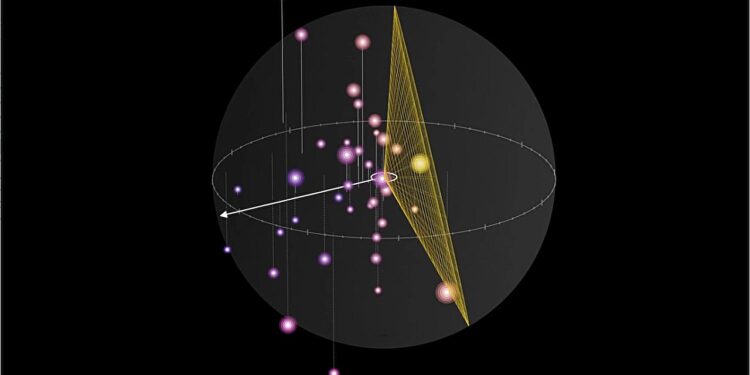Credit: Leibniz Institute for Astrophysics Potsdam
Andromeda’s galaxy is surrounded by a constellation of dwarf galaxies which are arranged in a very unbalanced way. Analysis of cosmological simulations published in Natural astronomy reveal that this degree of asymmetry is only found in 0.3% of similar systems, painting Andromeda as a striking aberrant value in the current cosmological paradigm.
The spatial distribution of galaxies provides crucial information on cosmology and physics of dark matter. According to the standard cosmological model, small galaxies merge over time in a chaotic process to form larger ones, leaving swarms of weak dwarf galaxies which orbit massive host galaxies in an almost random arrangement.
But new research at the Leibniz Institute for Astrophysics Potsdam (AIP) show that the satellite galaxies of the neighboring galaxy of Andromeda (M31) have surprising and so far unexplained properties.
Instead of being randomly distributed around their host galaxy, as predicts the standard cosmology model, more than 80% of these dwarf galaxies are concentrated on one side of the Andromeda galaxy. A recent data set of homogeneous distance measures for 37 Andromeda satellites highlights this unexpected arrangement.
More specifically, all Andromeda satellites, except one, are less than 107 degrees from the line pointing to the Milky Way, a region covering only 64% of the host environment. Until now, it has not been clear if this particular configuration considerably questions the current cosmological model or is the cosmic variance range.
“This asymmetry persisted and even became more pronounced when weaker galaxies have been discovered and their refined distances,” explains Mr. Kosuke Jamie Kanehisa, PH.D. AIP student and author of the study. “Our analyzes show that such a model is extremely rare in current cosmological simulations.”
Modern cosmological simulations, which follow the evolution of galaxy in cosmic time, provide a precious tool to predict and compare galaxy systems in the standard cosmological framework.
“Using two prominent simulations, we sought Andromeda -type guest galaxies and analyzed the spatial distribution of their dwarf satellites using personalized measures to quantify asymmetry. The comparison of the observed configuration of Andromeda to these simulated analogues revealed that its satellite distribution is extraordinarily rare”, explains Dr. Marcel S. AIP.
“We have to look at more than three hundred simulated systems to find only one that is just as extreme in its asymmetry as observed.” This makes Andromeda an extreme aberrant value, defying cosmological expectations.
The asymmetry of Andromeda becomes even more perplexed when it is combined with its other unusual characteristic: half of its satellites co-orbit in a fine and flat structure, recalling the planets in orbit around the sun. The coexistence of such a plan of satellite galaxies and an unbalanced satellite distribution is very unexpected in the standard cosmological model.
This raises questions about the question of whether the evolutionary history of Andromeda is only abnormal or if our understanding of the formation of small -scale galaxies is incomplete.
Although these results question current cosmological theories, they are strongly based on the precision of underlying simulations, which are limited by the way in which they model stellar physics and the evolution of the galaxy.
The following steps are to determine whether the configuration of Andromeda is a single outrage or if there are similar anisotropic galaxy systems elsewhere.
The efforts to study remote systems and the search for comparable asymmetries are already underway, and new generation surveys like Euclid accelerate this research. In addition, a more in -depth analysis of the history of the merger of Andromeda will help to determine whether such extreme asymmetries can occur naturally in a universe dominated by darkness – and why they remain absent in current simulations.
More information:
Kosuke Jamie Kanehisa et al, the asymmetrical satellite system of Andromeda as a challenge to the cold cosmology of dark matter, Natural astronomy (2025). DOI: 10.1038 / S41550-025-02480-3
Andromeda’s unbalanced galaxy challenges the standard cosmology, Natural astronomy (2025). DOI: 10.1038 / S41550-025-02481-2
Supplied by Leibniz Institute for Astrophysics Potsdam
Quote: The satellite galaxies have been wrong: the cosmology of the asymmetrical companions of Andromeda (2025, April 11) recovered on April 11, 2025 from
This document is subject to copyright. In addition to any fair program for private or research purposes, no part can be reproduced without written authorization. The content is provided only for information purposes.


